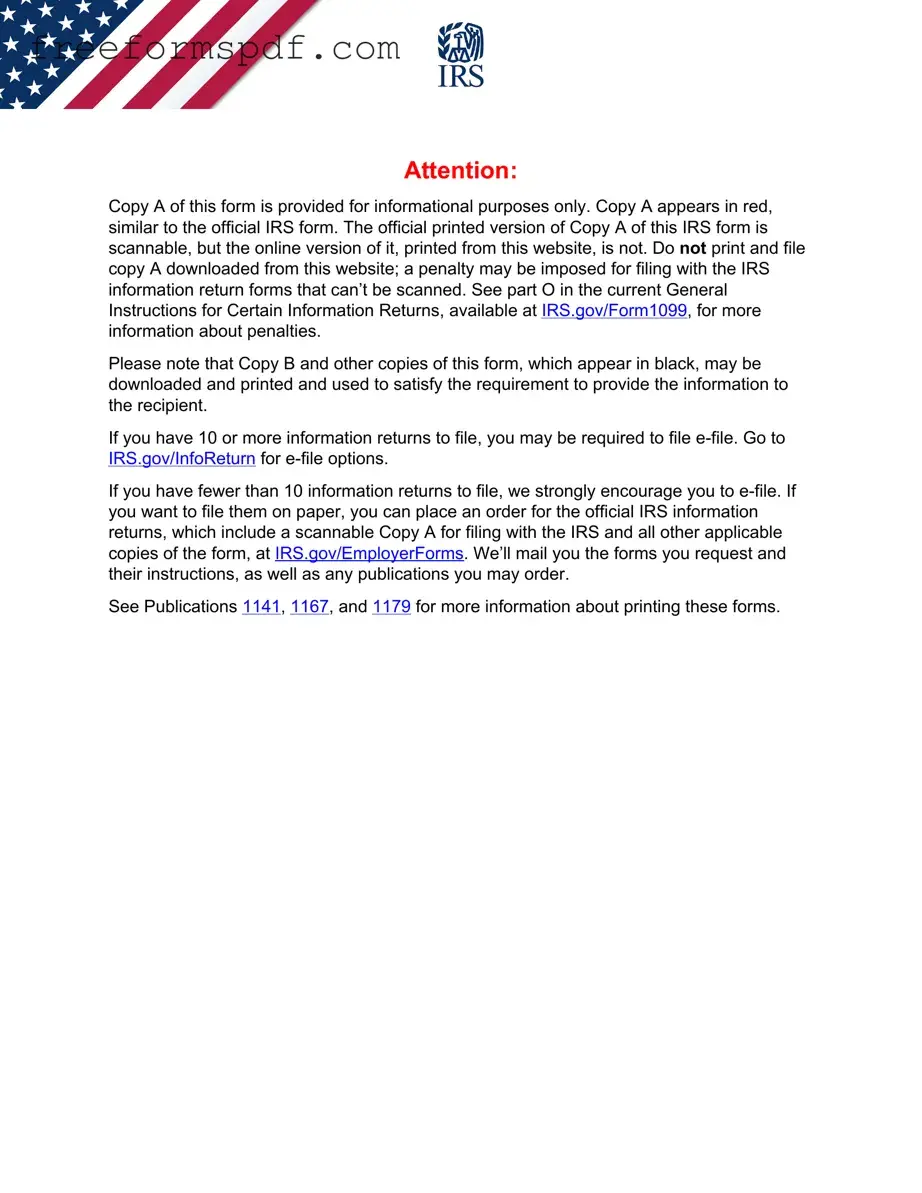Fill in a Valid IRS 1099-MISC Template
Common mistakes
-
Incorrect Recipient Information: One common mistake is providing incorrect or incomplete information about the recipient. This includes misspellings of names or incorrect taxpayer identification numbers (TINs).
-
Wrong Box Selection: The 1099-MISC form has several boxes for different types of payments. Failing to select the appropriate box can lead to confusion and potential penalties.
-
Missing Amounts: Some individuals forget to fill in the payment amounts. Leaving these fields blank can result in delays or issues with the IRS.
-
Incorrect Payment Amounts: Entering the wrong payment amounts is another frequent error. It’s essential to double-check these figures to ensure accuracy.
-
Not Filing on Time: Failing to submit the form by the deadline can lead to penalties. It’s crucial to be aware of the filing dates and plan accordingly.
-
Improper Signature: The form must be signed and dated correctly. An unsigned form is considered invalid, which can complicate matters.
-
Using the Wrong Form Version: The IRS updates forms periodically. Using an outdated version of the 1099-MISC can lead to complications and rejections.
-
Not Keeping Copies: Failing to retain copies of the submitted forms can create issues if the IRS questions the information later. Always keep a record for your files.
-
Neglecting State Requirements: Some states have their own filing requirements for 1099 forms. Overlooking these can result in additional penalties.
-
Ignoring IRS Instructions: The IRS provides detailed instructions for filling out the 1099-MISC. Ignoring these guidelines can lead to mistakes that could have been easily avoided.
Learn More on This Form
-
What is the IRS 1099-MISC form?
The IRS 1099-MISC form is used to report various types of income other than wages, salaries, and tips. This form is typically issued to independent contractors, freelancers, and other non-employees who receive payments for services rendered. It helps the IRS track income that may not be reported on a standard W-2 form.
-
Who needs to file a 1099-MISC?
If you paid someone $600 or more in a calendar year for services, rent, prizes, or other income, you must issue a 1099-MISC to that individual or business. This requirement applies to payments made to independent contractors, freelancers, and other non-corporate entities. However, payments made to corporations typically do not require a 1099-MISC.
-
What information is required on the 1099-MISC?
The form requires several key pieces of information:
- The payer's name, address, and taxpayer identification number (TIN).
- The recipient's name, address, and TIN.
- The amount paid during the year in various categories, such as nonemployee compensation, rents, and royalties.
- The type of payment made, which is indicated by checking the appropriate box.
-
When is the 1099-MISC due?
The deadline for providing the 1099-MISC to the recipient is January 31 of the year following the tax year in which the payments were made. If you are filing the form with the IRS, the deadline is typically February 28 for paper filings and March 31 for electronic submissions. Timely filing is crucial to avoid penalties.
-
What are the penalties for not filing a 1099-MISC?
Failure to file a 1099-MISC can result in penalties. The amount varies based on how late the form is filed. For forms filed within 30 days of the due date, the penalty is typically lower. If filed after 30 days but before August 1, the penalty increases. Filing after August 1 or not filing at all can lead to the highest penalties. It's important to be aware of these deadlines to avoid unnecessary costs.
-
Can I file the 1099-MISC electronically?
Yes, you can file the 1099-MISC electronically through the IRS Filing Information Returns Electronically (FIRE) system. Electronic filing is encouraged, especially if you are submitting multiple forms, as it simplifies the process and can help ensure accuracy. Additionally, e-filing may allow for faster processing by the IRS.
Misconceptions
The IRS 1099-MISC form is often misunderstood. Here are four common misconceptions about this important tax document:
- Only independent contractors receive a 1099-MISC. Many people believe that this form is exclusively for independent contractors. However, it can also be issued to freelancers, vendors, and anyone who has received $600 or more in payments for services rendered.
- Receiving a 1099-MISC means you owe taxes. Some individuals think that just because they receive this form, they automatically owe taxes. While it does report income, the actual tax liability depends on various factors, including deductions and overall income.
- The 1099-MISC form is the only way to report non-employee income. It's a common belief that the 1099-MISC is the sole form for reporting non-employee income. In reality, the IRS has introduced the 1099-NEC form specifically for reporting non-employee compensation, which can lead to confusion.
- You don't need to report income if you don’t receive a 1099-MISC. Some people think they can ignore income if they don’t receive this form. However, all income must be reported to the IRS, regardless of whether a 1099-MISC is issued.
Understanding these misconceptions can help individuals better navigate their tax responsibilities and ensure compliance with IRS regulations.
Browse More Forms
Da Form 638 Fillable Pdf - Recommenders must provide their own identification and relationship to the nominee.
For those seeking to understand the intricacies of the Arizona Hold Harmless Agreement, this essential guide provides a comprehensive overview of its utility and implications. It is crucial for parties involved in activities with potential risks to be aware of how this form can safeguard their interests. Explore more about the agreement in this informative Hold Harmless Agreement context.
Printable Timesheet - Employees must submit their Time Card for payroll processing.
Broker Price Opinion Form - Differentiating features of the property are described in detail.
